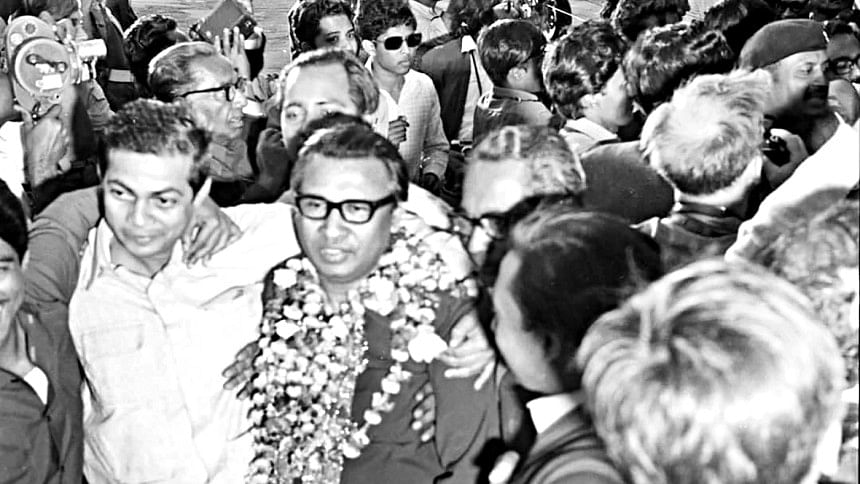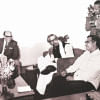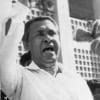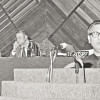Tajuddin Ahmad man who shaped history

The historic journey of the people of Eastern Bengal in the middle half of the last century, to be more precise from 1947 to 1971, was an amazing story with great impact on the post-colonial social and political development of the subcontinent.
The destiny of Tajuddin Ahmad is intertwined with this historical process that demands a deeper study as we celebrate the birth centenary of this extraordinary political personality, who was a witness to history, a humble contributor at a critical juncture, and was destined to play the vital role of guiding Bangladesh to its emergence during the nine months of the Liberation War.
The British left India in 1947 with the division of the subcontinent along religious lines. The line of physical demarcation drawn over the map of Punjab and Bengal resulted in unprecedented internecine killing and the uprooting of people across the border on a scale nobody could predict or imagine. But the line of partition was more devastating in the minds and psyches of a large number of Muslims and Hindus all over the subcontinent. The emergence of Pakistan on the basis of the "Two-Nation" theory solidified this division, and even within Pakistan, the ruling coterie denied the national rights of the Bengali-speaking population, overshadowing this with a majoritarian religious identity. The linguistic-ethnic identity of the Bengali people was essentially secular and inclusive, where national identity was never a negation of religious identity; rather, it embraced the multi-religious reality of the nation. This struggle culminated in the emergence of Bangladesh in 1971, not as the dismemberment of Pakistan but as a new state based on a different philosophy—a secular, liberal, democratic one. Right from his youthful days, Tajuddin Ahmad was associated with this national aspiration, furthering the commitment to serve his people. He left a track record of his journey from a social activist to a young United Front member of the Provincial Assembly in his diaries, written from 1946 to 1954. It is a rich personal and political narrative that reflects the commitment, determination, and zeal of young Tajuddin Ahmad.
He was more engaged in serving his people and therefore took a secondary role in the political movement. His politics was shaped by his concern for the welfare of the people. As a member of the Muslim League in his earlier days, he always searched for an alternative to the elitist, communal leadership of the Nawabs of Dhaka. He belonged to the radical Abul Hashem group within the Muslim League. He was a man of action with deep love for his community; at the same time, he was thoughtful, looking for the right path to freedom and emancipation. On 25 May 1950, as a student of Economics at Dhaka University, he critically noted in his diary that reforms cannot be accomplished in isolation. If one focuses only on social structure and tries to address injustice without a broader outlook, he will only complicate the process. This may turn the reformers into victims.
On 22 August 1954, he wrote about a lecture in the Economics Department delivered by Dr R. Ahmed on "Problems of Distribution of Wealth in Islam." He noted the lecture was not up to the mark. In many of the diary entries, he mentioned the weather of the day—a legacy of lessons he learned as a student of the Missionary School. His diary, interestingly, is also written in English. While chronicling the rainfall, he sometimes noted how the peasants would benefit from such downpours.
The diary shows that Tajuddin Ahmad had an eye for detail and was a very organised man, with deep concern for his people. He was always ready to serve society, with no claim for a leading role. Ultimately, in the 1960s, the leadership was bestowed on Bangabandhu Sheikh Mujib by the people, and Tajuddin Ahmad was chosen to be his deputy by being elected as General Secretary of the party. They were destined to play a complementary role that created history, especially during the turbulent days of March 1971, when Bangabandhu Sheikh Mujibur Rahman called for a comprehensive non-cooperation movement that paralysed Pakistan's authority over the eastern part and established the virtual supremacy of the people's representatives elected in the national election of 1970. The call was made by Sheikh Mujib, while Tajuddin Ahmad's thoughtful everyday directives from the party headquarters steered the movement forward in a complex situation.
On 7th March 1971, Sheikh Mujib made the historic speech at the Race Course Ground, virtually declaring the independence of Bangladesh while falling short of a formal proclamation. It was a delicate situation, where Bangabandhu, as the leader of the majority party in Pakistan, had the claim to legitimate authority. On the other hand, instead of handing over power to the elected representatives of the people, the military rulers decided to resolve the political crisis through military might and resorted to genocidal acts to establish their control over the population.
The struggle for Bangladesh was not a secessionist movement but a legitimate part of the broader struggle of oppressed nations for their right to self-determination. On the evening of 7th March, a press note in English was circulated by the Awami League to the international press, setting the context and legitimacy of the people's struggle for Bangladesh. This statement was clearly drafted by Tajuddin Ahmad, with the help of a few close associates of the party. The press statement noted, "We, as the representatives of the overwhelming majority of the people of Bangladesh, assert that we are the only legitimate sources of authority for Bangladesh. The events of the last seven days have shown that all branches of the government functioning throughout Bangladesh have accepted us as the sources of legitimate authority and have carried out our directives."
The legitimacy of the struggle for Bangladesh stood on a solid foundation. Therefore, when the Pakistani rulers scuttled the negotiations for a political settlement and resorted to a brutal military attack, Sheikh Mujib declared independence—having the legitimate authority to do so. Following his arrest, Tajuddin Ahmad took the helm as party secretary and elected representative of the people. He and his colleagues did not lose any time in proclaiming the People's Republic of Bangladesh and forming the government. The following nine months were the worst of our time, and the best of our time. Tajuddin Ahmad steered the nation to a glorious victory during those turbulent days of war.
Dr Kamal Hussain, a Professor of Political Science, wrote a book on Tajuddin Ahmed, where he pointed out that Tajuddin to Sheikh Mujib was what Chou En-lai was to Mao Tse-tung, or Che Guevara to Fidel Castro. They had their differences, but they always worked together, and history judges them not in comparison but in compliance. More than the other duos, Mujib and Tajuddin worked in tandem throughout their lives, and both embraced death almost simultaneously—in August and November of 1975—at the hands of the same group of conspirators.
The birth centenary year calls for a study of Tajuddin from a broader perspective, where his greatness and unique contributions can be highlighted in historical context, not blurred by contemporary political views or parochial interests.
Mofidul Hoque is an essayist and cultural activist.

 For all latest news, follow The Daily Star's Google News channel.
For all latest news, follow The Daily Star's Google News channel. 







Comments